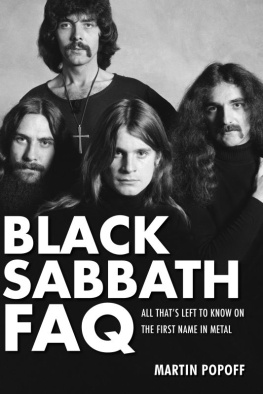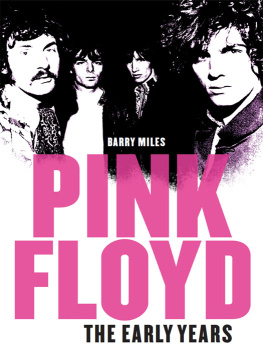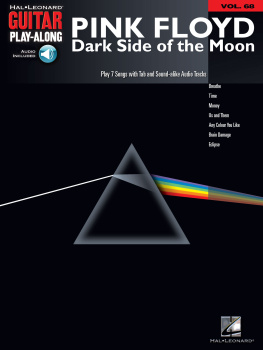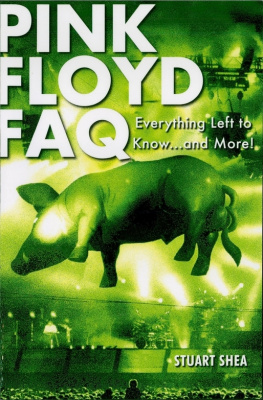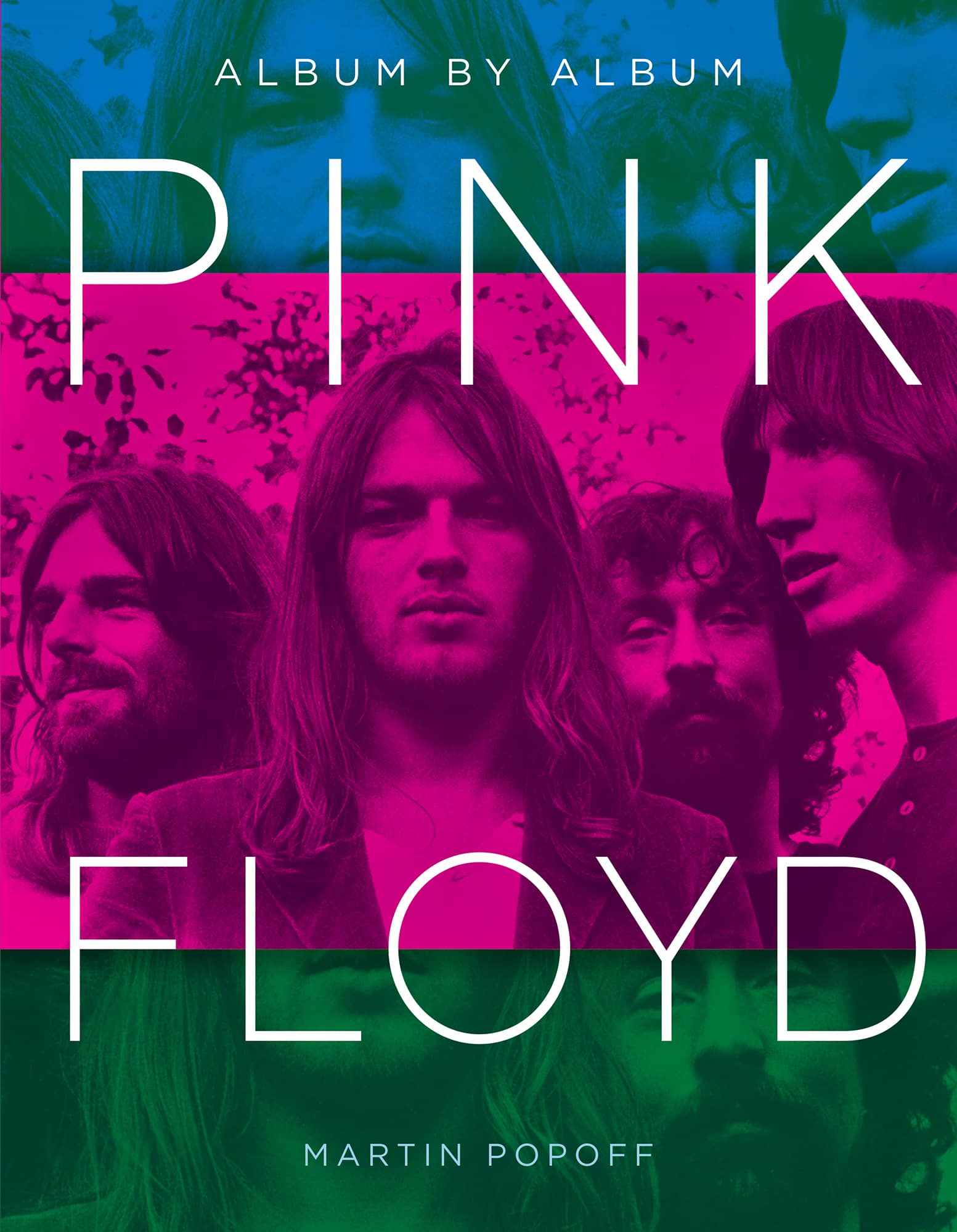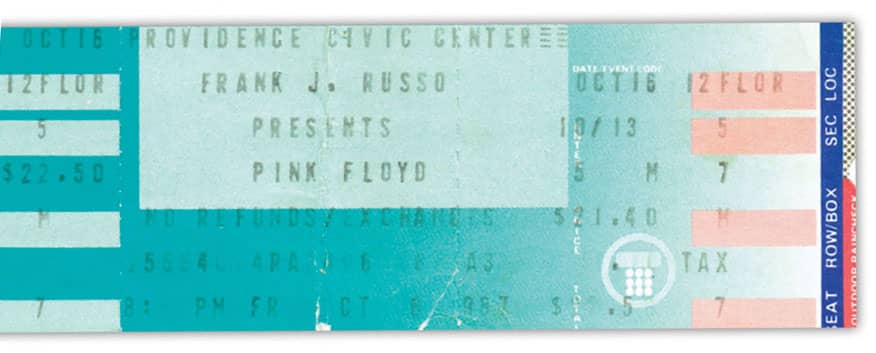INTRODUCTION
R eflecting on my listening experiences with Pink Floyd over the decades, my first instinct was to assume that most have been very deep and contemplative, befitting the gravitas of the bands famed Immersion box setsdeep psych sessions on Rogers couch, a little hypnosis thrown in for good measure, after which my personality was refracted in a new direction, likely toward the sullen, fatalistic, and cynical.
But then the memories began flooding back: educations from cousins and older brothers of friends as to the seriousness (and stoner sacrament) of The Dark Side of the Moon and Animals; that school band trip to Boise, Idaho, during which The Wall was played (at quite a low volume for once) at the back of the bus, we music heads mumbling along, seeing who could recite the next effect, discussing the storylines, ticking off band teacher Mr. White, who saw revolution on wheels in We Dont Need No Education.
Later there were the university years and ruminations over The Final Cut, in conjunction with loving the new wave of British heavy metal and its more modest adjunct neo-prog movement. Later still it was A Momentary Lapse of Reason during my first job out of MBA school (with Xerox), followed by Floyd in hi-fidelity, heard from those way-back seats at the McLaughlin Planetarium next to the Royal Ontario Museum in Toronto.
Finally, I achieved a more sophisticated level of communion closer to the business end of Floyd when I began transitioning into the rock n roll biz through an upstart heavy metal magazine with my buddy Tim Henderson. Here me an the writer buds would ponder things like a 1994 with a new Pink Floyd studio album and where classic rock and metal and prog fit in a music industry in which grunge, techno, industrial, and various other forms of alternative rock were killing the careers of our heroes.
So, gosh darn it, despite the tendency to think one is alone and intense with ones Floydbe it the massiveness of the band or the discussion-provoking concepts therein or even the sound effects and spoken bitsPink Floyd has turned out to be an improbable meeting place of minds yearning for extra protein with their lunch, willing to take those long runs, relishing a good read of the lyric sheet, happy that the party got quiet.
And in that light, Pink Floyd: Album by Album became another one of those communal Pink Floyd experiencesspecifically the interviews, which had the soothing effect of demonstrating the shared solitary contemplation of Floyd that I figured (but never really confirmed in direct conversation) millions of people share around the world.
But it was also deeply satisfying to witness what different fans emphasized when asked about Floyd. I heard excitement (mostly couched in reverence) across the board, touching down on guitar work, keyboards, album covers, concepts, and, most regularly, Rogers dense and intense lyrics. A few folks made it personal, or rather, wanted to make sure their personal connection with the band was told.
As a result, I emerged out the other end re-educated in whatever level of mastery of the catalog I thought I had (especially preDark Side), as well as placated by the understanding that Floyd can be enjoyed alone and with a crowd, that the shared humanity of it all would be enough to shed any reclusive tendencies I might have had. Really, I couldnt have asked for a better crowd with which to share Pink Floyd, and I thank them one and all for making this book entertaining and informative on a readerly level and, on a personal level, making my relationship with Floyd that much richer.
And so, without further introductory musings, I hope this deep-tissue massage of Pink Floyds fifteen studio albums does for you what it did for me, beginning with dusting off your collection in whatever format it resides for an enriched listen to the myriad facets you always knew were there but perhaps had not reflected oer (like myself with some of these records) in a long, long time.
DISCOGRAPHIC NOTES
A few notes on the presentation of the album credits:
Credits and citations of all types, where available, are reproduced to be in the spirit of the earliest UK issue of album.
Song timings are cited per the earliest issue of the album from any territoryif not available on UK issue as was the standard, I deferred to the US or Canadian issue from the same year.
Ive cited only last names, even if first names were used in the original issues. Where Gilmour was spelled Gilmore in original credits, I overruled and went with the correct spelling, even if I left the odd Dave vs. David (and it was Nicky Mason who played drums on Piper!).
Where there were discrepancies on writing credits or song spellings and punctuations, the back cover took precedent over the label (except for Ummagumma, where the record label made more sense); note that the official releases are wildly inconsistent with song title subsectioning.
Writing credits that distinguish between music and lyrics are not common with Pink Floyd, so the comma is used so as not to cause errors, especially when four names are listed; as well, the distinction is maintained where it has been made clear, such as on The Division Bell.
Performance credits are as cited per earliest issue (including the order of names and the exact wording), but where no performance credits were listed, I went with best estimates of personnel and instrumentation; however, some reordering has been done using the criteria of importance, especially when it comes to guest performances.
It is recognized that no further demarcation was cited for single-song performers or the occasional performance or vocal on a track, nor for producers of certain sessions (i.e., The Endless River). Songs are not in double quotes in this area of the book to promote neatness.
Obvious typos have been fixed (note the misspelling of Britannia Row in The Division Bell).
References to the Pink Floyd have been changed to Pink Floyd.
Other liberties were taken when the situation required itcomplicated records, these are. Especially in the early years.
CHAPTER 1
THE PIPER AT THE GATES OF DAWN
WITH DENNIS DUNAWAY AND PAUL KEHAYAS
SIDE 1 |
1. Astronomy Domine
(Barrett) | 4:08 |
2. Lucifer Sam
|


